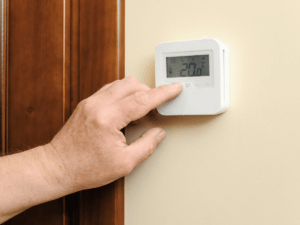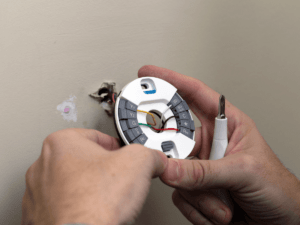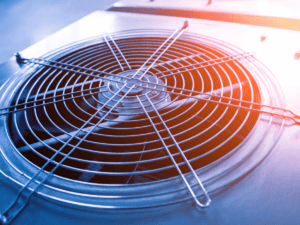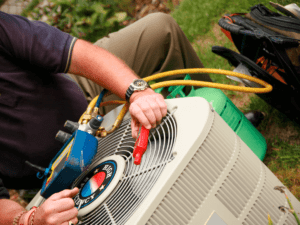Maintaining your HVAC consists of a lot of things, so we are here for you to understand the tips for maintaining your HVAC systems in accumulated conditions.
Good maintenance will ensure that your system runs efficiently.
These tips will also help you to prolong its life span, avoid costly repairs and save you some bucks on your electricity bills as well.
Tips for Maintaining your HVAC System as a Homeowner

1. Arranging Periodic Inspections for Maintenance Checks
Several heating, ventilation, and air conditioning (HVAC) firms provide service agreements that incorporate routine care checks.
Opting out of these assessments may result in more severe complications and costly repairs.
Just like any other equipment, your HVAC mechanism requires periodic maintenance to operate effectively.
It is noteworthy that certain issues may go undetected by a layman, but professionals possess the expertise to identify them.
Some things the expert will do during a routine maintenance check are:
Check the thermostat to make sure it’s working properly, clean or replace filters,
lubricate moving parts, check the refrigerant level, listen for unusual noises, and inspect the condenser and coils.
2. Change The Filters of your HVAC System Frequently
Filters should be changed every few months or as mentioned in the instruction manual by the manufacturer.
A dirty filter can clog the airflow and cause the system to render even harder, which will reduce efficiency and can elevate your electric costs.
Keep in mind that worn-out filters can also cause a fire if not replaced or cleaned time by time.
One of the most straightforward and crucial HVAC maintenance tips is changing your air filters frequently.
3. Keep the Surroundings Tidy
Make sure that the area around your HVAC system isn’t dirty.
This is also a vital task for maintaining your HVAC system running efficiently.
Keep the area tidy and clear of any obstacles such as fallen leaves, branches, etc. near your HVAC system.
This will prevent the airflow from getting clogged or blocked by any nearby substance.
And ensure that the airflow is sufficient enough for your HVAC system to work efficiently and will also prevent it from overheating.
4. Don’t Obstruct the Airflow
Avoid positioning any objects in front or near your HVAC system, such as furnishings, carpets, or foliage.
Ensure to leave sufficient space around your HVAC system for appropriate ventilation.
Such actions will restrain the air flow and push the HVAC system to operate harder.
Which will result in reducing the overall efficiency and increase your energy expenses.
Limited or blocked air circulation can also result in your HVAC system being overheated.
5. Monitor your Energy Bills
You can ensure the efficiency of your HVAC system by keeping an eye on your energy bills.
If you evaluate a sudden hike in your electricity bill, it could be an indication that your system requires comprehensive maintenance.
Because it might be producing low levels of refrigerant or a blocked filter that needs to be cleaned immediately.
Besides keeping an eye on your energy bills, it is also important to assess how quickly it heats or cools your house or space and check if it’s delivering sufficient heating or cooling.
6. Consider Using a Programmable Thermostat
Consider using a programmable thermostat because it can help you save money by saving a lot of energy.
It allows you to opt for a different set of temperatures throughout the whole day.
For example, you can lower the temperature with your programmable thermostat when you are somewhere out.
Hence it will reduce the amount of electricity used and that will impact on you paying a lower electricity bill.
7. Ensuring a Comprehensive Inspection by An Expert Every year
Yearly tune-up handles more than regular maintenance.
An Expert knows his/her job better than us and so we suggest you should leave this task to them.
They will inspect the unit for possible problems and make essential repairs and substitutes.
This will reduce the chances of you paying pricey repair bills and will also ensure that your HVAC system runs efficiently.
This task consists of performing a comprehensive inspection of the entire heating and cooling system.
Including cleaning and adjusting all equipment, lubricating all moving parts, checking refrigerant levels, testing ignition, and safety controls, and replacing furnace filters.
8. Routinely Clean your HVAC System Entirely
Routinely cleaning your HVAC system entirely can keep it running without any hurdles in between.
So you should clean all off the inside, outside, and the air vents with a brush, fabric, or vacuum.
Clean the air vents using a hose by doing so you will ensure that there is no dirt or pollutants circulating in the air that can affect you or your family as a source of infection.
9. Seal any Leaks Around the Unit
Lastly, make sure to check for any leaks in your HVAC system, and if you find some just seal them up with water and air-resistant tape.
So that no cool or hot air escapes in between or else it will increase the digits in your electricity bill.
Or it’s best to hire a professional to seal up the leak.
Final Thoughts
Never ignore maintenance issues, as they can lead to costly repairs in the long run and can reduce the lifespan of your HVAC system as well.
Following these tips will keep your home comfortable and your HVAC system running smoothly and can help you reduce your electricity bills.








Pingback: Best Smart Thermostats Under $100 in 2023 | Meta Domotics